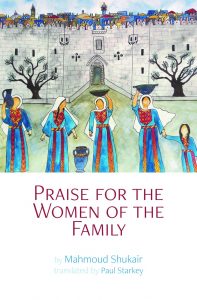By Mahmoud Shukair
Translated by Paul Starkey
Interlink Books, Massachusetts, 2019, 238 pages, $25
Reviewed by Mahmoud Muna
The bookseller of Jerusalem, The Educational Bookshop
In the large Al-‘Abd al-Lat clan that lives on the outskirts of Jerusalem, namely Jabal al-Mukabbar, a senior figurehead called Mannan has many sons and grandsons from several marriages. Through the lives of Mannan’s wives, in-laws, and daughters, Mahmoud Shukair writes one of the most honest accounts of Jerusalem’s social history and the changes that shaped Palestinian society between 1930 and 1980.
The character development in this novel is exemplary and fresh, especially now, when many writers in the Arab world are writing about women in ways that either reproduce stereotypical Western images or superficially portray a progressive society that is more like fantasy than reality. In this book, the characters and their contradictions are real, honest, and genuine.
The author is not yet well-known to English readers but has written 45 books, 6 television series, and four plays in Arabic. He has been a leading member of the Jordanian Writers’ Union and a senior member of the Union of Palestinian Writers and Journalists. In 2011, he was awarded the Mahmoud Darwish Prize for Freedom of Expression.
Perhaps what makes this novel an important work is the way in which the role of women in the family is depicted, not in isolation but rather within its wider social and economic dynamics. Without fear or censorship, the author digs deep into issues of polygamy, infertility, underage marriage, abandonment of women in order to work abroad, and the oppression of women by women.
As in many other Palestinian families, the members of Al-‘Abd al-Lat clan are also in the diaspora, living and intermarrying with others. This defragmentation, its motivations as well as the consequences, are presented to reveal the complexities of Palestinian identity, the challenges but also the opportunities. It is perhaps sad to read about the unpatriotic Palestinian who leaves his country in search of a better economy in Brazil, but then it thought-provokingly contrasts beautifully with the love and solidarity relationship that develops between his half-Brazilian son and Palestine.
Through the main characters, the author has managed to brilliantly place us in the nomadic life of the southeastern desert of Jerusalem, documenting the community habits, customs, and societal traditions that shape the lives of both women and men. But he also highlights the changes of such norms over time. Politics, the economy, and modernity, among other factors, have been important in the transformation of these traditions.
The social transformation becomes much clearer towards the end of the novel when it opens up to address the broader issues of urbanization, globalization, and economic “development.” New realities are pushing against established ethics and cherished values: old vs. new, beliefs vs. myths, culture vs. education.
Although the author narrates most of the story through the prism of the women, he in no way neglects the role of men. On the contrary, he describes their conditions and the hardships they often experience in the context of Palestine. It is precisely this balance that makes the novel the most honest, open, and explicit read about Palestinian family interrelations.
The original novel’s Arabic language is simple and clear, neither exaggerated nor ornamented. Paul Starkey’s English translation adds charm and fluidity. Keep your eye on this author. After this elegant and captivating novel, many more of his works will be translated into English.


